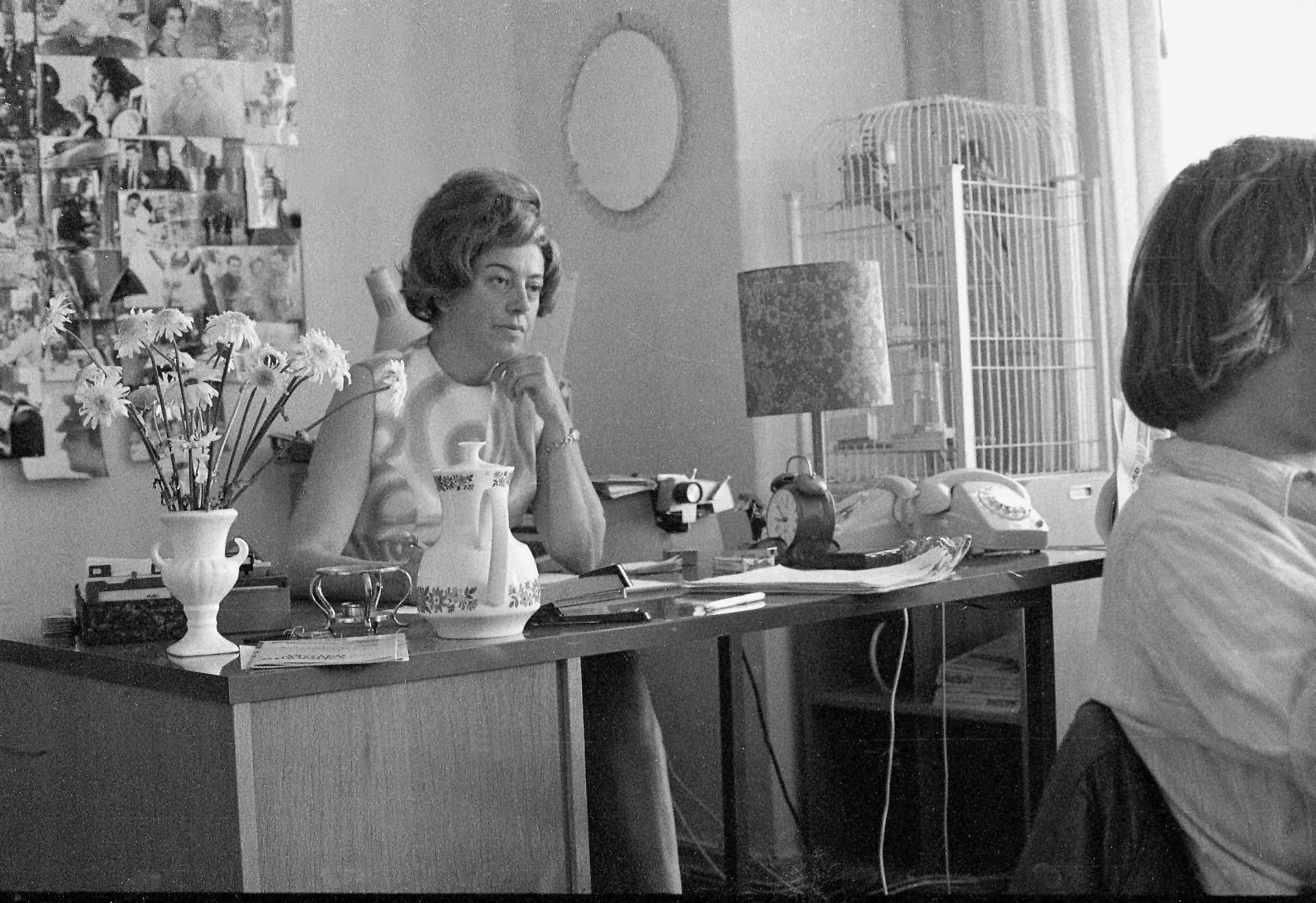History

The beginnings
After more than a decade of planning, the time had finally come on 17 September 1966: the governing mayor of Berlin, Willi Brandt, ceremoniously opened the German Film and Television Academy Berlin as the first film school in West Germany. The artistic director is the renowned documentary film director Erwin Leiser, Heinz Rathsack, former film officer at the Ministry of Culture in Kiel, becomes administrative director. Full-time lecturers in the first year are Ulrich Gregor (film history) and Peter Lilienthal (directing). Among the students in the first year are illustrious names such as Wolfgang Petersen, Helke Sander, Harun Farocki, Hartmut Bitomsky and Holger Meins - although one is missing: Rainer Werner Fassbinder was rejected by the admissions committee. Helene Schwarz was there right from the start, initially as a student affairs officer, always approachable and with an open ear for the students.
DFFB students were at the centre of the student movement around 1968, earning the DFFB a reputation as Germany's most political film school that continues to this day: In May 1968, it was occupied by a group of students and renamed the ‘Dsiga-Wertow-Akademie’ for a short time. A red flag flies over the building on Theodor-Heuss-Platz, which the DFFB shares with Sender Freies Berlin. In November 1968, a conflict that had been smouldering between students and management since the first exams in 1967 escalated: 18 students were dismissed without notice and banned from the premises, and shortly afterwards the artistic director Erwin Leiser resigned after the lecturers withdrew their trust. Politicians are not far away from winding up the Academy, which has only just opened.
It is mainly thanks to the diplomatic skills of Heinz Rathsack - who will remain in office until his death in 1989 - that things continue. The following decade is characterised by political filmmaking. The feature films of the ‘Berlin School of Labour Cinema’ by students and graduates such as Christian Ziewer, Max Willutzki, Ingo Kratisch and Marianne Lüdcke, political documentaries and some of the first feminist films in the Federal Republic of Germany were made side by side.
Something changed with the class of 1979: for the first time since its foundation, more women than men were accepted and female filmmakers such as Ute Aurand, Lily Grote, Bärbel Freund, Ulrike Pfeiffer, Irina Hoppe and Ilona Baltrusch brought new and above all experimental life to the leaden political film school in the years to come.
With "Okay, okay. Der moderne Tanz", the experimental first-year film by Christoph Dreher and Heiner Mühlenbrock, the culture of punk and new wave broke through the DFFB in the same year. Nick Cave appears in several films by students, lives temporarily on the same factory floor as Dreher and Mühlenbrock and finally Uli M. Schüppel follows him on his US tour, "The Road to God Knows Where". Countless experimental film and video works are created and slowly a renewed interest in feature films awakens.
While Ludger Blanke, Wolfgang Schmidt, Georg Maas, Michael Freerix and Christoph Willems made quirky slacker films full of humour, there were also stronger ambitions to enter the commercial film and television business for the first time since the early days. Wolfgang Becker and Detlev Buck were the most successful in this respect - the latter, a farmer's son from Schleswig-Holstein, ‘bribed’ the commission with a sack of potatoes at the entrance exam, according to legend.
The DFFB from the 90s onwards
During the era of Heinz Rathsack, which ended with his death in December 1989 and was followed by two brief intermezzi as director with Martin Wiebel and Thomas Koebner, a new trend in auteur cinema began to emerge at the DFFB, which was finally given a label around the year 2000: Berlin School. Its protagonists Christian Petzold, Thomas Arslan and Angela Schanelec have remained the figureheads of this era to this day.
In the twelve years of his tenure, Reinhardt Hauff focuses on professionalisation from 1993 onwards and introduces new courses in screenwriting and production alongside the core competencies of directing and cinematography. Collaboration with broadcasters was expanded, giving students more and more opportunities to make feature-length graduation films, some of which were also released in cinemas, including Plus minus Zero, Berlin is in Germany and Mitfahrer.
Graduates such as Chris Kraus, Eoin Moore, Hendrik Handloegten, Hannu Salonen, Martin Eigler and Lars Kraume are now regular directors and authors in the German cinema and television landscape.
The DFFB since 2005
Following the resignation of DFFB Director Reinhard Hauff in 2005, there are protests from students who criticise the appointment procedure, which is carried out together with the University of the Arts, as lacking transparency. Finally, Hartmut Bitomsky, the favourite candidate of many students, became director of the DFFB in 2006. After Hartmut Bitomsky's resignation in 2009, Jan Schütte was appointed as his successor following an appointment procedure. Over the next few years, successful films such as "Oh Boy" by Jan Ole Gerster and festival favourites such as "Das merkwürdige Kätzchen" by Ramon Zürcher, "Ich will mich nicht künstlich aufregen" by Max Linz and Julian Radlmaier's "Ein proletarisches Wintermärchen" were made. Following the departure of Jan Schütte in 2014, there are considerable differences between students and the Board of Trustees regarding the appointment process and student participation. In 2015, Ben Gibson is elected as the new director of the DFFB by an appointment committee after an academy public presentation of the candidates.
With the departure of Ben Gibson, Sandra Braun took over as acting director of the DFFB until the end of July 2021. From 1 August 2021, Catherine Ann Berger as Commercial Director and Marie Wilke as Artistic Director jointly managed the DFFB; from August 2022, Catherine Ann Berger was the sole Managing Director of the DFFB. Wolf Plesmann has been Managing Director of the DFFB since 15 September 2023.
Fabian Tietke, Frederik Lang & Ralph Eue
